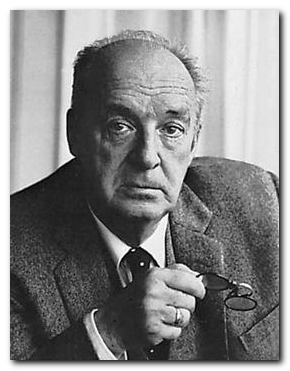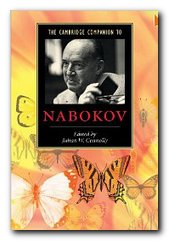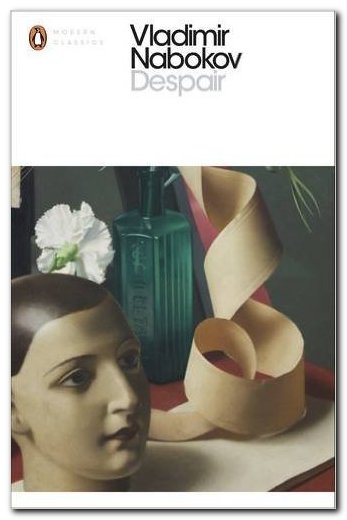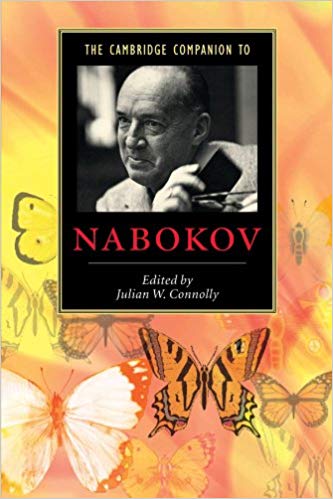tutorial, commentary, plot, and study resources
Despair was written in 1932 when Vladimir Nabokov was living in exile in Berlin and it was first serialized as Otchayanie in the émigré review Sovremennye Zapiski in Paris. It was then released in single volume book form by the publishing house Petropolis in Berlin in 1936. The following year Nabokov made a translation into English (his third language) which was then published by John Lane in London in 1937.
Nabokov re-translated the novel in 1965 as part of the post-Lolita refurbishment of his earlier works that had been written in Russian and were largely unknown to readers in the English-speaking world. In an author’s foreword he admits that “I have done more than revamp my thirty-year-old translation” – and it is certainly true that the current text bears a number of the hallmarks of Nabokov’s mannered later prose style.
Despair – critical commentary
The unreliable narrator
This is one of Nabokov’s many fictions in which a first person narrator is seriously deranged or neurotic almost to the point of madness. An early example is the self-obsessed Smurov in The Eye (1930); the most famous is Humbert Humbert, the confessional paedophile narrator of Lolita (1955), and in 1962 Charles Kinbote the fictional editor of Pale Fire turns his madness into a work of literary interpretation. All of these characters, despite their self-regard and even their crimes, remain grotesquely fascinating because of the entertaining prose style Nabokov gives them by which to transmit their stories.
Hermann is unreliable in the sense that his narrative is a novel-length study in self-justification. He has nursed the illusion of having met his own double, has murdered him both to collect on the insurance and as he believes, a creative work of artistry – the perfect crime. Hermann is vain, boastful, and even admits to being a liar; he misinterprets events; he is blind to his wife’s adultery, and he thinks himself superior to everyone else in the novel.
Nabokov’s literary skill is in creating a first person narrator through whose eyes all available information is relayed to the reader – who is nevertheless able to discern the ‘truth’ lying behind the events and opinions in the narrator’s account. Nabokov offers a playful and complex game of literary hide-and-seek to the reader, planting clues in his text for the reader to enjoy and decipher.
He always plays fair by the rules of narrative logic and gives readers a chance to work out the subtlest of clues. For instance Hermann is caught out in his crime because he leaves Felix’s walking stick (which also bears his name) in the car he has abandoned in the countryside – but both the stick and its signature have been mentioned previously, planted deep within the narrative for the attentive (or eagle-eyed) reader to spot.
Narrative mode
Even though it is not easy to see how much the original Russian version was ‘improved’ during its later translation, the narrative is clearly very sophisticated. Technically, Herman is delivering the story after its events have concluded. He has read newspaper reports of his crime and decides to compose his own account of what happened.
But throughout the novel Nabokov very skilfully combines a timescale that includes the narrative present, with Hermann’s reflections on his own account of events, plus flashes forward in time. Yet in order to retain the reader’s interest, Nabokov must not give away too much of the story which is yet to come – so Hermann’s ‘premonitions’ are masked as psychological curios or mere eccentricities. But they are actual pointers to the fact that he knows what will happen because he is giving his account in retrospect.
For example, early in the novel, when Hermann visits the countryside allotment with Lydia and Ardalion (Chapter Two) he feels that the locale is ‘familiar’. It is familiar to him, because it is where he has just killed Felix before starting to write his narrative. .
Conversational style
Nabokov exploits the full range of possibilities offered by a first person narrative mode and the quasi-conversational manner that he made famous. As the narrator, Hermann addresses the reader, he thinks aloud, interrupts himself, ( ‘Well, as I was saying’) and comments on the process of composition, often trailing off onto irrelevant topics:
‘but I am digressing, digressing—maybe I want to digress … never mind, let us go on, where was I?’
Built in to the narrative is a meta-critique of fictional techniques and novel clichés – many of which are clearly self-referential:
‘How shall we begin this chapter? I offer several variations to choose from. Number one (readily adopted in novels where the narrative is conducted in the first person by the real or substitute author):
He also criticises alternative conventions of literary presentation – including the epistolary novel:
‘it would be possible now to adopt an epistolic form of narration. A time-honored form with great achievements in the past. From Ex to Why — “Dear Why” — and above you are sure to find the date … The reader soon ceases to pay any attention whatever to the dates’
With almost predictable irony, Hermann himself abandons his sequence of chapters, and adopts a popular literary mode — “Alas, my tale degenerates into a diary … the lowest form of literature” — complete with dated entries, the last of which is April 1st.
Despair – study resources
![]() Despair – Penguin Classics – Amazon UK
Despair – Penguin Classics – Amazon UK
![]() Despair – Penguin Classics – Amazon US
Despair – Penguin Classics – Amazon US
![]() Otchayanie – Russian original – Amazon UK
Otchayanie – Russian original – Amazon UK
![]() Otchayanie – Russian original – Amazon US
Otchayanie – Russian original – Amazon US
![]() The Cambridge Companion to Nabokov Amazon UK
The Cambridge Companion to Nabokov Amazon UK
![]() Vladimir Nabokov: The Russian Years – Biography: Vol 1
Vladimir Nabokov: The Russian Years – Biography: Vol 1
![]() Vladimir Nabokov: American Years – Biography: Vol 2
Vladimir Nabokov: American Years – Biography: Vol 2
![]() Zembla – the official Nabokov web site
Zembla – the official Nabokov web site
![]() The Paris Review – Interview with Vladimir Nabokov
The Paris Review – Interview with Vladimir Nabokov
![]() Nabokov’s first English editions – Bob Nelson’s collection
Nabokov’s first English editions – Bob Nelson’s collection
![]() Vladimir Nabokov at Wikipedia – biographical notes, links
Vladimir Nabokov at Wikipedia – biographical notes, links
![]() Vladimir Nabokov at Mantex – tutorials, web links, study materials
Vladimir Nabokov at Mantex – tutorials, web links, study materials
Despair was also made into a film in 1978 by the German director Rainer Werner Fassbinder. It features Dirk Bogard in his last starring role as Hermann, and has a screenplay written by Tom Stoppard.
![]() Despair – film on DVD – Amazon UK
Despair – film on DVD – Amazon UK
Despair – principal characters
| Hermann | a Russian of German descent living in Berlin (35) |
| Lydia | his scatterbrained wife (30) |
| Felix Wohlfahrt | a vagrant |
| Ardalion | Lydia’s cousin, a would-be painter |
| Orlovious | a bachelor friend of Hermann |

Despair – chapter summaries
Chapter One Herman is in Prague on chocolate factory business. Strolling on a local hill, he comes across Felix the tramp. Hermann is convinced he is his double.
Chapter Two Hermann is a communist sympathiser, whilst Lydia is not. He starts growing a beard and avoids mirrors. He gives a self-centred account of Lydia and her scatter-brained attitudes , and then describes his experience of physical disassociation. Herman and Lydia visit an allotment her cousin Ardalion has bought in the countryside.
Chapter Three Herman reflects on his childhood passion for writing, which he thinks of as ‘lying’. He introduces the character Orlovius, and mentions problems in the chocolate business. Meanwhile, he makes further visits to Ardalion’s countryside retreat.
Chapter Four Herman writes to Felix with an offer of work and arranges to meet him. Lydia spends a lot of time with her wastrel cousin Ardalion. Herman visits the town where he is to meet Felix. Elements of the town remind him of other places he has visited.
Chapter Five Herman meets Felix and pretends to be a film actor, then spins him a yarn about wanting an understudy. Felix doesn’t believe him and refuses the offer. Herman takes him back to his hotel room for the night and explains the real plan. He wants him as a visual alibi whilst he does something illegal. In the early morning, Herman leaves Felix asleep and goes back home.
Chapter Six It is clear to the reader (but not to Hermann) that Lydia is having an affair with her obnoxious cousin Ardalion. Someone calls at the house asking for Hermann, who has him sent away, thinking it is Felix. But it turns out to be a friend of Ardalion, and Hermann suddenly wonders if Felix will write to him.
Chapter Seven Hermann goes to the post office and collects letters left poste restante from Felix. They complain then menace him with vague threats of blackmail. He writes to Felix with instructions then tries to bribe Ardalion to go to Italy.
Chapter Eight Ardalion borrows money and is much delayed in his departure for Italy. Hermann invents a story of discovering a long-lost brother for Lydia. He has a scheme of planting his own identity on Felix, killing him, then collecting the insurance money. He rehearses Lydia’s part in the plot, even though she is very reluctant to participate.
Chapter Nine Hermann reflects on his literary enterprise. He has plans to send his manuscript to a famous Russian émigré writer. He drives into the countryside, where he meets Felix. He shaves Felix, exchanges their clothes, and then shoots him. He then escapes by train.
Chapter Ten Hermann supplies his narrative with an ending in which all his plans are successful – but then returns to the truth. He goes to a quiet French hotel near the Spanish border. When the murder is reported in newspapers he goes into complete denial and is angry that they make no mention of the similarity of victim and murderer. He decides to write his own version of events.
Chapter Eleven Hermann buys another newspaper and reads that his car has been discovered. He re-reads his manuscript and realises that Felix’s walking stick (which bears his name) was in the car. He picks up a pre-arranged letter from Lydia, but it turns out to be an offensive rebuke from Ardalion. He moves to rooms in a little village, but is immediately recognised, detected, and his account ends whilst he is awaiting arrest.
Vladimir Nabokov – web links
![]() Vladimir Nabokov at Mantex
Vladimir Nabokov at Mantex
Biographical notes, book reviews, tutorials, study guides, videos, web links, and essays on the Complete Short Stories.
![]() Vladimir Nabokov at Wikipedia
Vladimir Nabokov at Wikipedia
Biographical notes, list of major works, bibliography, and web links
![]() Lolita USA
Lolita USA
A ‘geographical scrutiny’ of Humbert and Lolita’s journey across America. Essay and photographic study by Dieter E. Zimmer.
![]() Vladimir Nabokov Writings – First Appearance
Vladimir Nabokov Writings – First Appearance
An illustrated collection of first editions in English. Photographs with bibliographical notes compiled by Bob Nelson
![]() Vladimir Nabokov at the Internet Movie Database
Vladimir Nabokov at the Internet Movie Database
Adaptations for the cinema and television – in various languages. Full details of directors and actors, plot, box office, trivia, continuity errors, and quiz.
![]() Zembla
Zembla
Biography, timeline, photographs, eTexts, sound clips, butterflies, literary criticism, online journal, scholarly essays, and an online annotated version of Ada – housed at Pennsylvania State University Library.
![]() Nabokov Museum
Nabokov Museum
A major collection housed in Nabokov’s old family home (now a museum) in St. Petersburg. – biography, photos, family home, videos in English and Russian.
© Roy Johnson 2016
 The Cambridge Companion to Nabokov Vladimir Nabokov held the unique distinction of being one of the most important writers of the twentieth century in two separate languages, Russian and English. This volume offers a concise and informative introduction into the author’s fascinating creative world. Specially commissioned essays by distinguished scholars illuminate numerous facets of the writer’s legacy, from his early contributions as a poet and short-story writer to his dazzling achievements as one of the most original novelists of the twentieth century. Topics receiving fresh coverage include Nabokov’s narrative strategies, the evolution of his world-view, and his relationship to the literary and cultural currents of his day. The volume also contains valuable supplementary material such as a chronology of the writer’s life and a guide to further critical reading.
The Cambridge Companion to Nabokov Vladimir Nabokov held the unique distinction of being one of the most important writers of the twentieth century in two separate languages, Russian and English. This volume offers a concise and informative introduction into the author’s fascinating creative world. Specially commissioned essays by distinguished scholars illuminate numerous facets of the writer’s legacy, from his early contributions as a poet and short-story writer to his dazzling achievements as one of the most original novelists of the twentieth century. Topics receiving fresh coverage include Nabokov’s narrative strategies, the evolution of his world-view, and his relationship to the literary and cultural currents of his day. The volume also contains valuable supplementary material such as a chronology of the writer’s life and a guide to further critical reading. ![]() Buy the book here
Buy the book here
More on Vladimir Nabokov
More on literary studies
Nabokov’s Complete Short Stories

